Weekly Writing Summary For The Week Ending 11/13/2025
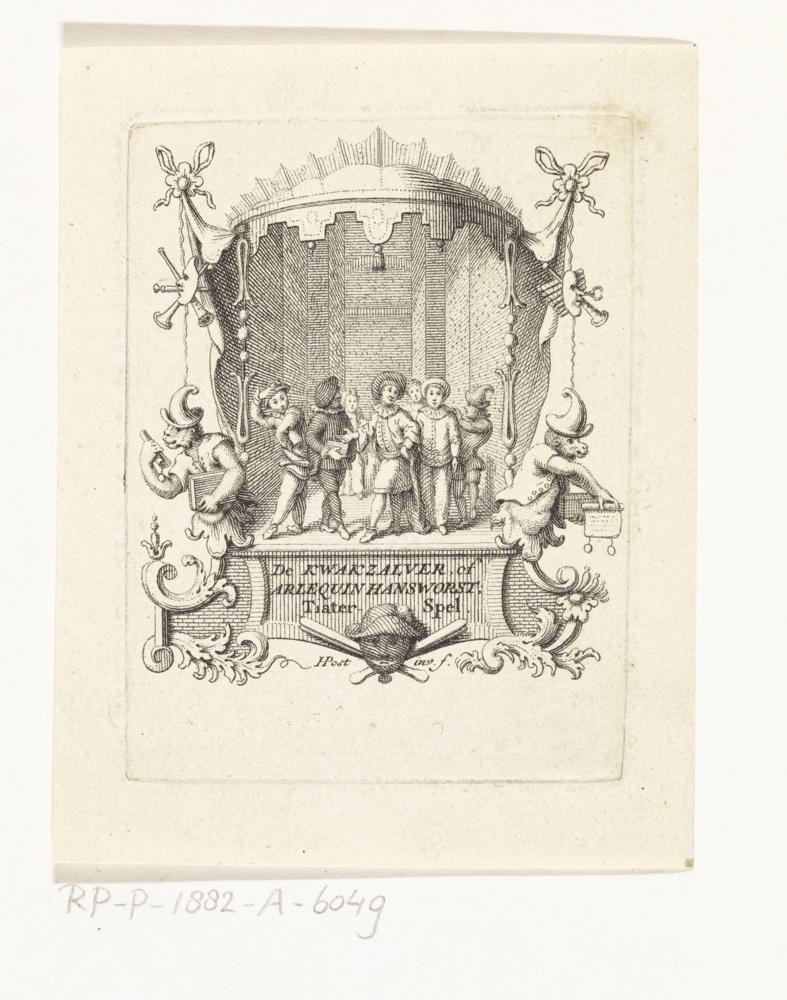
Hendrik Post: Title vignette of "the quack" (1718 - 1751)
Vignette with a group of actors inside an ornamental frame with musical instruments and masks and two monkeys with zots hoods, holding books and documents with stamps. The title of the farce is on a wall under the stage.
This writing week proved to be a genuine discovery. As usual, I set off on this adventure not understanding the purpose of the excursion. I consider this factor to be de rigeuor. If I planned beforehand or (shudder) outlined the trip before I took it, I sense that I might have leached most of the eventual potential out of it. I entered naked and, right off the bat, I hit at least a double into the corner with ThanksTaking. In this venial season of political degradation, it made perfect sense (and I make no overstatement suggesting this) to downgrade the usual, familiar Thanksgiving celebration to the level of the typical druid appreciation: roasted gruel with a side of sour cide, instead of the usual turkey with trimmings. I then entered into a short series of side-explorations, considering the relationships between Decency and Disgrace, Disgust, and Misdirection. I then slipped into a half-remarkable question: What might be the MotiveToDecency, given that it offers no clear evolutionary superiority? I ended this writing week admitting that I've been increasingly resembling one of my old nemeses, whom I had always considered somehow beneath me: the venerable and disturingly similar to me, the ever-Decent Mr. Magoo! Thank you for following along on these voyages of discovery!
——
Weekly Writing Summary
ThanksTaking
“Our fathers grant to thee, expanding liberty, of this we sing. Land where our father’s tried to live genuinely Decent lives, protect us by thy light, let freedom ring!“
This Decency Story reports that The War On Decency has targeted Thanksgiving, plotting to replace it with ThanksTaking this year.
The Decency Story argues that the administration’s recent actions have deeply damaged the tradition and spirit of Thanksgiving by cutting food assistance to the vulnerable and creating dysfunction in public services like air traffic control, threatening both the sense of abundance and the ability to travel home: ThanksTaking. I connect these actions to a broader erosion of Decency and our already meager social safety, primarily criticizing Repuglicans for undermining American optimism and communal values. By recalling the holiday’s origins and the resilience of earlier generations, I call for a humble, reflective observance focused on Decency and future gratitude, rather than on material excess.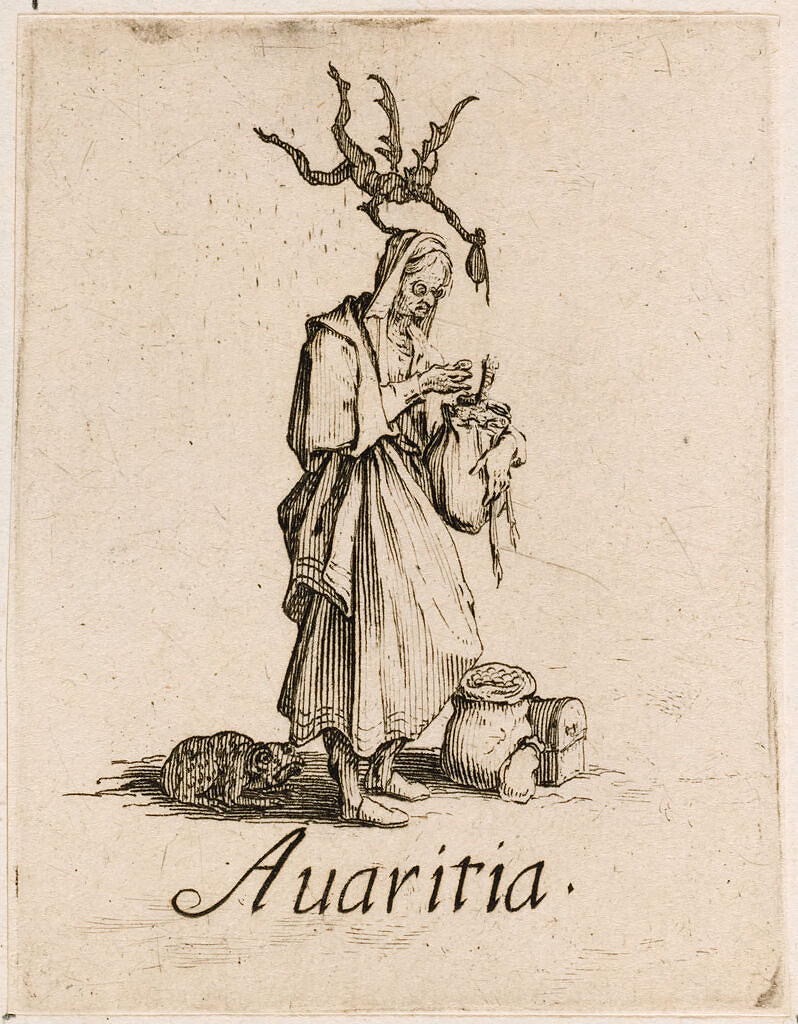
Jacques Callot: Avarice - Series/Book Title: Seven Deadly Sins (17th century)
——
Disgrace
“Wherever Decency seems endangered, some Disgrace is being denied.”
This Decency Story explores the association between Decency and Disgrace.
This Decency Story discusses how indecency and disgrace seem closely linked, suggesting that one often conceals the other. Indecency serves as a mask for shame or disgrace, emerging under extreme circumstances and seeking secrecy. Groups may rally around indecency to distract from some common disgrace. Shame might be the most damaging emotion, prompting people to engage in indecent acts just to avoid acknowledging feeling it. Public figures may use indecency as a diversion from their hidden disgraces, highlighting how denial and misdirection delay justice. Ultimately, wherever one finds an indecency, check for some hidden disgrace being denied.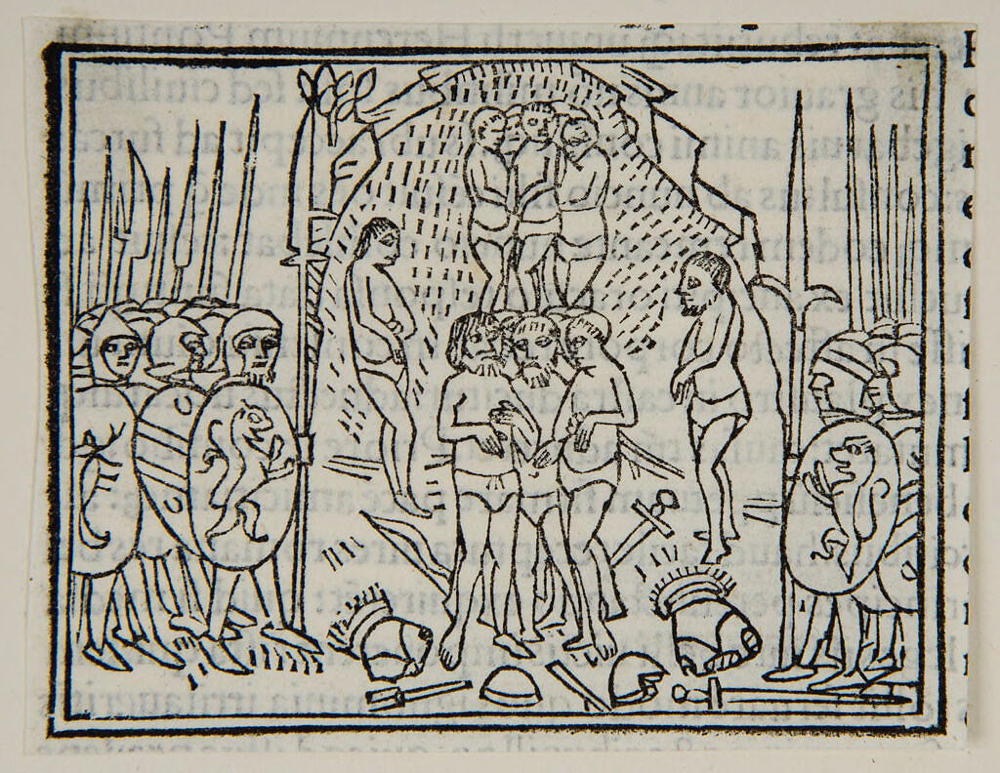
Anonymous Italian, Venetian: Book IX.5. Roman consuls are sent under the yoke of Samnites and are exposed to disgrace {Primae Decadis Liber Nonus p. LXXV} Series/Book Title: Illustrations from Livy, Decades. Venice, Philipp Pincio, September 27, 1511 (1493)
——
Disgust
“We bring the conversation around to less upsetting topics before the dessert course gets served to aid digestion.”
This Decency Story finds me Disgusted. It feels odd to notice that Disgust and Decency have once again become closely associated.
I discuss how expressions of disgust now seem common among decent people, particularly when observing societal and political decline. Disgust and decency must be interlinked, as those with moral sensitivity seem more likely to notice and become upset by troubling behavior or changes in standards. The shift in cultural norms has made people less sensitive to certain negative acts. Discussions of political perversion, especially regarding the presidency, frequently bond people who identify as more morally discerning. These conversations can become a quiet but persistent form of protest, often reserved for trusted company to avoid backlash.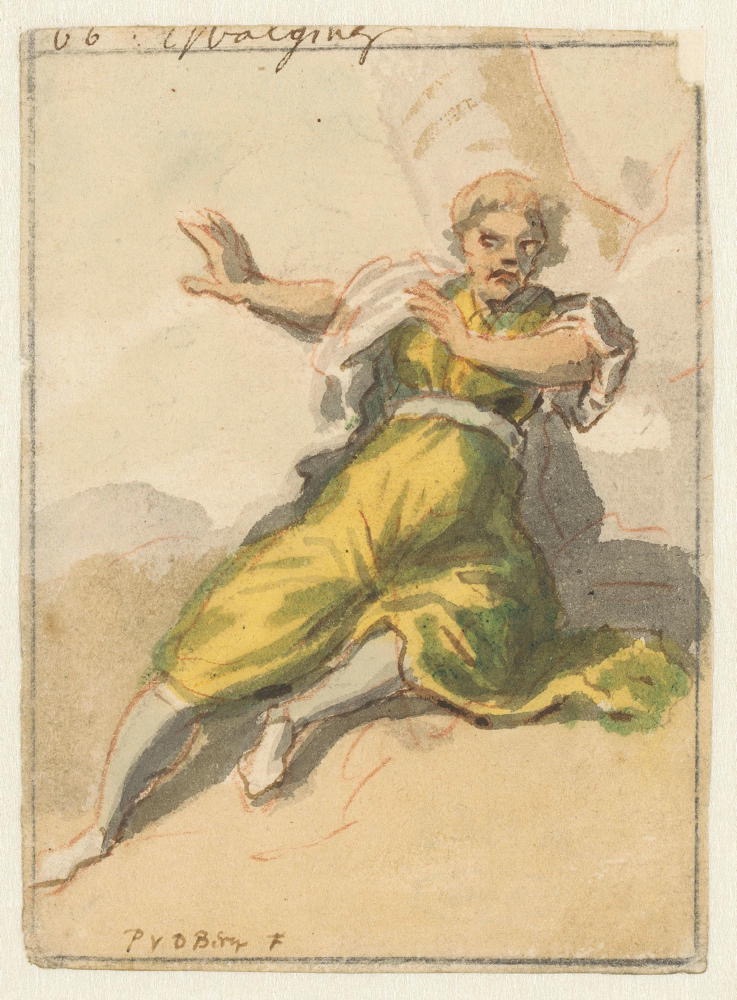
Pieter van den Berge: Disgust (1675 to 1737) - A man, and face, sitting on the ground, his legs and arms rejecting to the left.
——
MisDirection
“Why, then, does Decency so often prevail?”
This Decency Story demonstrates that Decency isn’t necessarily above deception. It sometimes resorts to MisDirection to succeed against some indecency.
In this Decency Story, I argue that decency and indecency are not true opposites and often overlap. Both can be strategic or flawed, and each can use misdirection to gain advantage. Illustrating this idea with a story about the recent government shutdown, I describe how Democrats seemed to lose but actually shifted the focus to a future debate over health care subsidies. This story suggests that decency can prevail by letting indecency undermine itself, and that their dynamic seems less about strict competition and more about layered interaction and perception.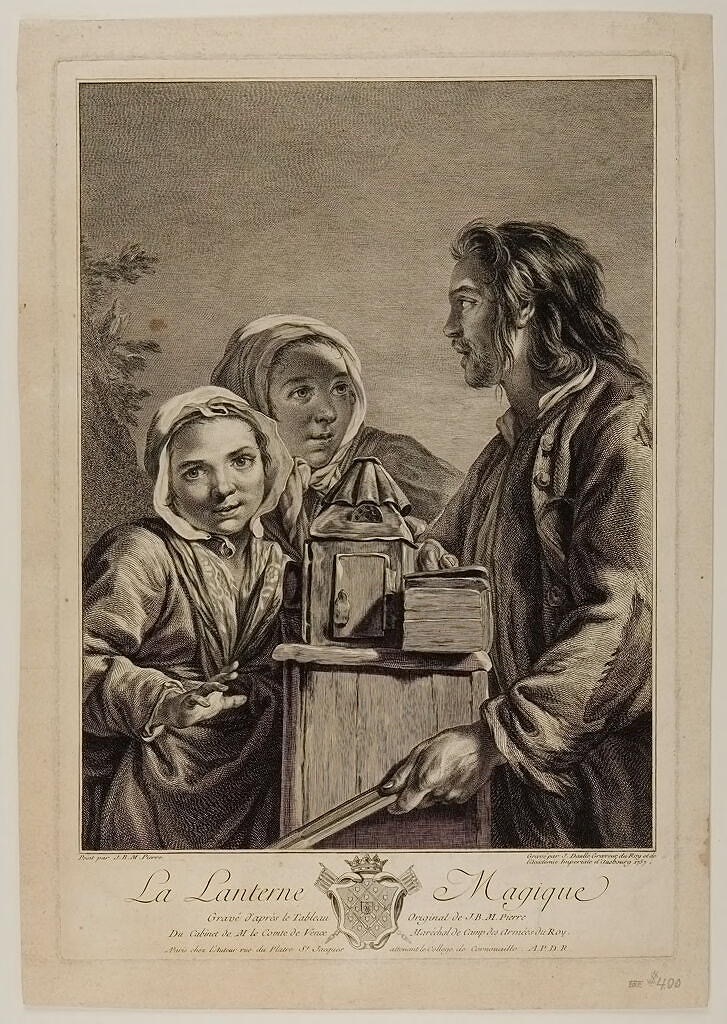
Jean Daullé: The Magic Lantern (1757)
——
MotiveToDecency
“It’s me, mustering my own Decency for its own sake. That’s plenty.”
This Decency Story wonders after my MotiveToDecency. For something that doesn’t seem to offer any evolutionary advantage, Decency sure seems sacred to me.
This Decency Story hovers dangerously close to a sermon. In it, I contemplate why Decency persists even though it provides no obvious material advantage or reward. Decency doesn’t translate into wealth, safety, or survival advantages; decent people can still suffer and are sometimes taken mean advantage of. Yet, Decency clearly seems widespread and forms the unspoken baseline for the bulk of human interaction, fostering trust and cooperation. We notice its absence acutely, as that leaves our lives feeling diminished. I strongly suggest that the true value and motivation for Decency seems intrinsic: it maintains the social fabric and has become a default value for human coexistence, even when it’s unacknowledged or lacking economic reward.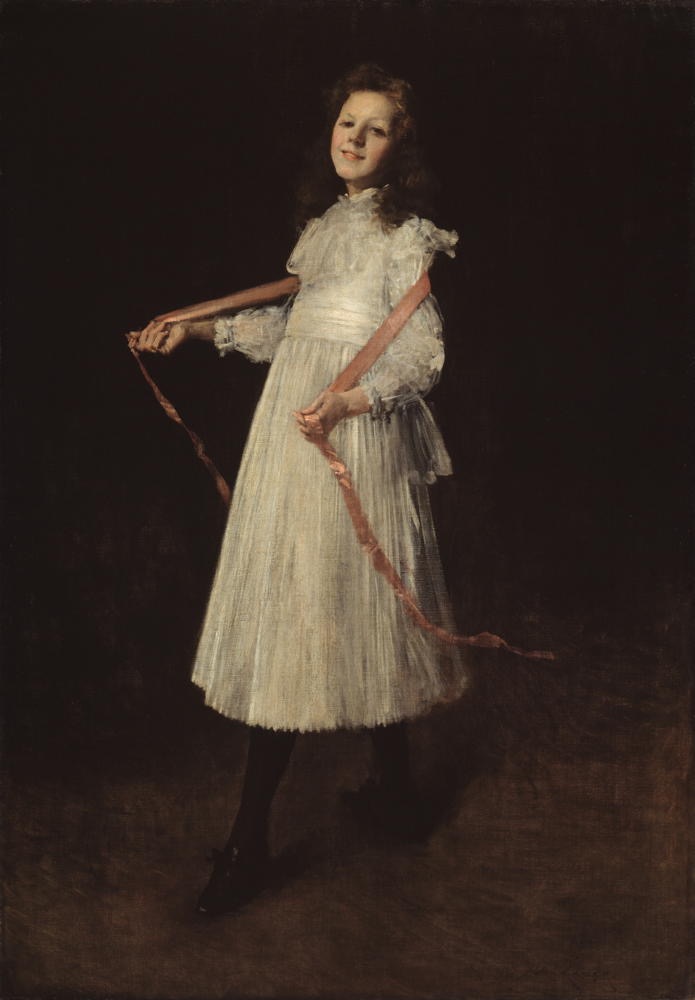
William Merritt Chase: Alice (1892)
——
MrMagoo
“Wisdom comes from noticing the ridiculed other is us.
Acknowledging this preserves Decency.”
This Decency Story finds me channeling my inner and outer MrMagoo.
This Decency Story employs Mr. Magoo, a cartoon character known for his oblivious innocence and near-sighted blunders, as a lens to examine my own recent continuing confusing experiences and mishaps. I describe incidents where my appointments were missed or misbooked due to misunderstandings and technological challenges, drawing direct parallels to Magoo’s continual misadventures. In reflecting on these events, I acknowledge a growing resemblance to Magoo and find comfort in embracing this harmless, well-intentioned way of being. The story concludes with a realization that wisdom and empathy come from seeing oneself in those one might have previously mocked.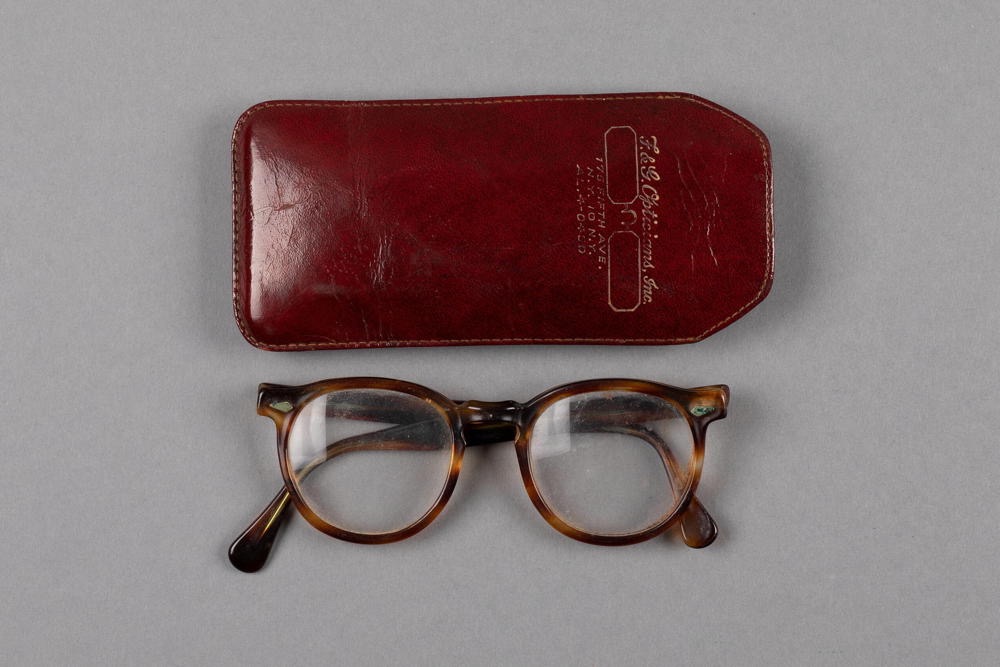
Eyeglasses, in case, Archival Material (20th century) - Collection of Barnett and Annalee Newman
——
Better Than Any Of Us Ever Deserve
A month ago this week, I sliced off the tip of my left thumb in a standard supper preparation accident. I'm no chef. The doctor who tended my wound the next morning at the emergency care facility introduced me to a novel therapy. It involved some 3M technology that closely resembles simply wrapping the wound in plastic wrap and replacing the dressing every five days. He warned me that some nasty stuff might accumulate beneath the bandage, but that I was not to take that stuff seriously. He told me to just keep changing the bandage every five days. Changing the bandage proved to be about as difficult as playing a zither one-handed, but I managed, spraying Bactine® on the wound and gently swabbing it with tissues to absorb the seepage. That doc had said that it might take three or four weeks to effect a complete healing, and it has taken a little more. I feel grateful that I didn't become a cripple from my carelessness, since that hand operates the fretboard part of my guitar. Today was the first day since the accident that I went without a bandage on that thumb. I still limped around, over-protecting it as it toughened to the environment. I am reminded how delicate I am and how much faith and persistence even a minor kitchen accident requires to heal. I hadn't noticed how much I depended upon my left thumb until it was rendered useless for a time. I couldn't properly cut, copy, or paste text, or delete an errant phrase. I had to invent two-handed replacements for preconscious functions while my formerly invisible thumb took center stage. As that emergency care doctor predicted, no permanent damage seems apparent. I've retained my thumbprint, which seems like an awfully meager payback for a month of discomfort. Back to where we were might be better than any of us ever deserve.
©2025 by David A. Schmaltz - all rights reserved


